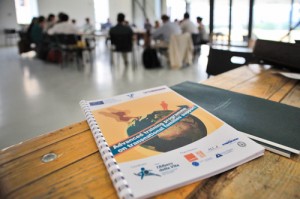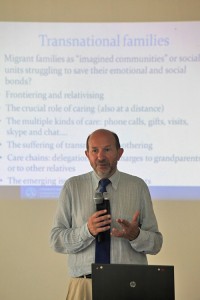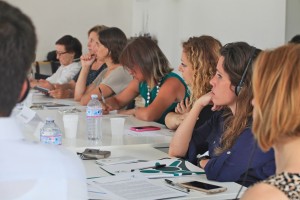CONFERENCE, GRUNDTVIG, HOME | by Daria Crimella
Final event of the Grundtvig project: round table on transnational welfare and presentation of the Advanced Training Programme
 On 13th of July 2015 Fondazione L’Albero della Vita organized the final event of the Grundtvig project “Advanced training program on transnational families support”. Project partners, experts, public and private stakeholders participated to the round table contributing with their own experience to the discussion.
On 13th of July 2015 Fondazione L’Albero della Vita organized the final event of the Grundtvig project “Advanced training program on transnational families support”. Project partners, experts, public and private stakeholders participated to the round table contributing with their own experience to the discussion.
Maurizio Ambrosini, professor of Sociology at University of Milan, and scientific consultant of the Advanced Training Programme, introduced the topic of transnational families. Migration for families is a difficult journey made of efforts to keep the relationship alive. Furthermore, nowadays 50% of migrants are women, often employed in the domestic care sector, many of them leaves children at home to the care of grandparents and neighbor.
Ambrosini pointed out three type of families in migration:
• First family: living together, before the departure of an adult member
• Second family: separated by borders, living in the mind and in home-sickness
• Third family: again together, after reunification

Reunification process could be seen as final part of the process it is important to underline that the family reunited in the country of residence of the migrant parent,often with reverse role: the father the reunited member , with the following problems that this new family structures imply.
Families in migration bring with themselves numerous challenges for the communities and
new problems which transnational welfare is strictly linked.
Professor finally underlined in its conclusion three mains aspect related to Family migration as :
• contentious issue, involving economic, social and cultural problems
• dynamic issue, framed with different steps: the three families of migrants
• transnational issue, demanding support on both sides of mobility
Secondly, Daria Crimella from Fondazione L’Albero della Vita presented the “Advanced Trianing Programme”.
The Modular course, is the results of two years Grundtvig project which involved eight organizations from seven countries: Fondazione L’Albero della Vita – coordinator – (Italy), Partnes Bulgaria Foundation (Bulgaria), Alternative Sociale (Romania), Teia Amiga (Portugal) , Soleterre –Strategie di Pace (Italy), Polish Migration Forum (Poland), Accompagnement, Lieux d’accueil, carrefour éducatif et social (France) and Afyonkarashisar Barosu (Turkey).
The Advanced Training Programme aims to improve the skills of professionals working with migrants, providing them with adequate tools to address the needs of transnational families in countries of origin and in countries of residences
The training values the heterogeneity of different partners’ approaches and backgrounds: some modules privilege a participatory approach, while others offers a frontal approach. Modules are based on the research developed throughout the projects meeting public and private stakeholders in each partner country.
Then Daniela Koralova, Executive director of Partners Bulgaria Foundation, highlighted the value of European partnership project. The positive aspects of building European partnership were pointed out: it Strengthen cooperation within European organizations and promotes integration of care providers, it improve the quality of support of Transnational Families through adult learning and sharing expertise and good practices. Partnerships results also in new cross border projects such as Family On the Move: Protecting transnational family rights in Europe and Justice for and with children in the EU.
The second part of the round table focused on the transnational welfare.
Mara Tognetti Bordogna introduced the topic of transnational welfare explaining from a theoretic point of view what are the main aspects of transnational welfare and why it is important to promote capacity building for professionals working with families separated by migration in order to meet to family needs .
Annalisa Brichese of Novimedia Social Cooperative, on behalf of the Municipality of Venice – Immigration and Asylum Service , with whom collaborates, related the experiences of both subjects with transnational families in Venice Province. Since Veneto is a region with large community of migrants from Eastern European countries, specific intervention have been tailored for children.
One of the main goal of the Immigration Service, as foreseen by the Italian Law 286/98 on migration, is to orient, inform and support migrants in family reunification process. Other areas of intervention are: cultural mediation with schools, communication workshops with adults, Italian courses, counseling to adults and minors and information on local services.
The Immigration service of Venice Municipality, Novimedia Social Cooperative and Fondazione L’Albero della Vita Onlus have been implementing a project “Behind the mirror” targeting migrant youth from eastern European countries to promote integration and dialogue with adults through digital storytelling techniques and focus groups.
Finally Tatiana Nogailic, President of AssoMoldave, reported the experience of an association of migrants committed with the support of transnational families, in particular to migrant mothers in Italy. First She gave an overview on Moldavian migration flux in Italy, including a focus on domestic care sector, the main sector of employment. Migrant associations play a fundamental role in orienting the migrants to local services and promoting integration. AssoMoldave was involved in transnational projects in support of migrant families with public and private stakeholders like IOM and the Italian and Moldavian Ministries of Labor.
In conclusion Tatiana pointed out what would be beneficial and desirable for an effective approach to the transnational welfare: facilitating bureaucracy, fostering integration of migrants and mutual comprehension, improving the capacity building for the use of remittances at private and local levels and finally fostering migrants associations committed in the protection on migrants families rights.

